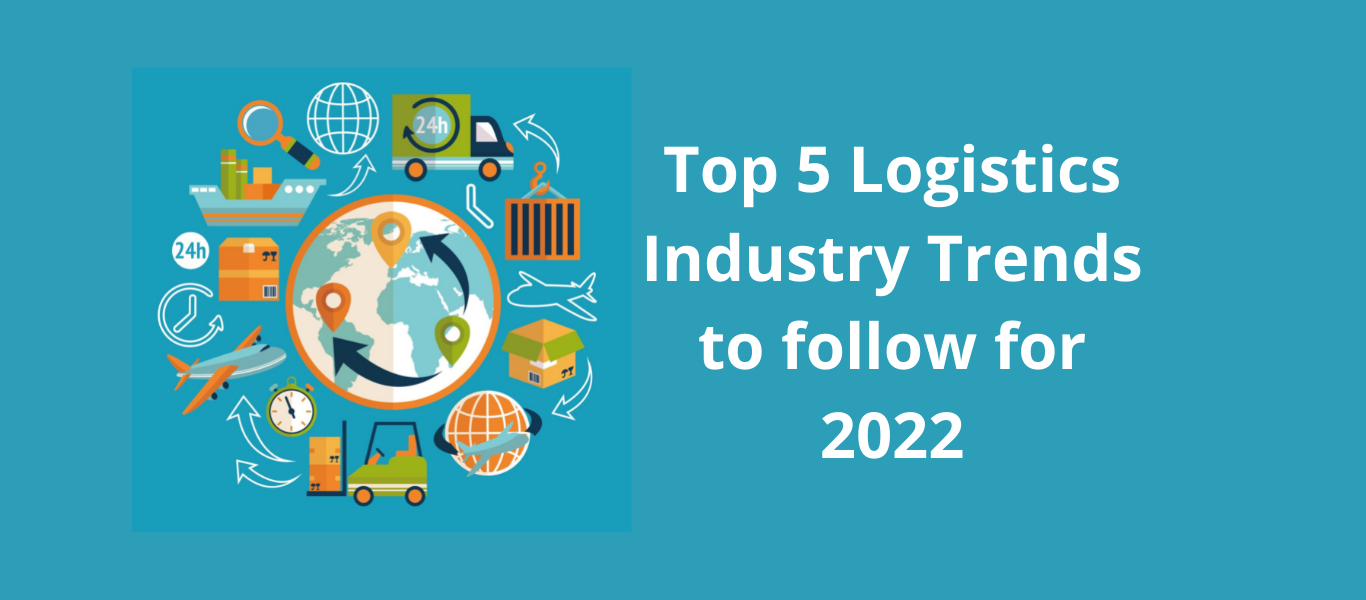Top 5 Logistics Industry Trends To Follow For 2022

The logistics industry has always been one of the most critical industries in any country. Logistics companies have been facing several challenges in recent years, from new regulations to changing customer demands and more. With an increasingly globalized economy, there has been a rise in demand for logistic services to facilitate trade and yield a competitive advantage. As more companies join this dynamic sector, it becomes increasingly important to stay ahead of trends and innovations shaping the future of logistics.
Logistics trends show that by 2022, the industry will undergo significant changes and will have important implications for logistics businesses around the globe. Logistics industry trends are already being set in motion to help shape how we live and work for generations to come. Knowing the industry trends is very important for a logistics and supply chain career path, here presenting the top 5 logistics trends which you should follow to improve your logistics business operations in 2022.
1. 3D Printing to make Products On-Demand :
3D printing is a new trend in the logistics industry. With 3D printing, companies can change their business model to do just-in-time production instead of mass production. This allows for more customization and less work wasted on products that may not be ordered or wanted by customers. In addition, manufacturers can produce parts that are tailored for each customer’s needs. This will further reduce waste and increase efficiency in manufacturing processes.
3D printers are being used at every stage of the supply chain process. They can be found in warehouses where they are producing mock-ups or replacements on demand. Their use is also spreading into distribution centers where orders are assembled before shipping out to customers around the globe via air freight or ocean vessel.
2. Artificial Intelligence Applications :
AI has many applications in the freight management sector. With AI, managing fleets is efficient by using data analytics software. It can help optimize routes based on weather or traffic patterns. This type of software will give you an edge over your competitors because it will allow you to plan more efficiently for changes in demand and supply.
It also helps to make more accurate predictions about the status of a vehicle, which can help with fuel allocation and scheduling maintenance. AI is already being used in the freight management sector, but it still has room to grow as an industry. With continued innovation and development, AI will become an essential part of managing any fleet.
3. Adoption of Cloud-Based Systems :
Cloud-based systems are becoming more and more popular in the logistics industry. Businesses in logistics can find significant benefits by adopting this new technology to optimize their business processes. The benefits of cloud computing include easy scalability, increased reliability, reduced costs. The other benefits also include less hardware maintenance and improved security through data encryption.
Cloud-based systems are becoming more and more popular in the logistics industry. These new technologies can help shippers reduce their operating costs, increase efficiency, and improve back-office operations. Because of this increased popularity, cloud computing is expected to grow significantly over the next five years.
4. Last-Mile Delivery :
The trend of businesses moving towards last-mile delivery is on the rise. Many entrepreneurs are shifting their focus on delivering goods locally to provide customers with a more personalized experience. This has also affected the logistics industry, seeing how this shift will affect their future business models and methods.
Last-mile delivery is a term used to describe the last leg of delivering goods from warehouses and distribution centers to the end customer. The trend for last-mile deliveries increased during recent years because it has become cheaper and more convenient than using couriers such as DHL, UPS or FedEx.
5. Blockchain Technology Integration :
Blockchain technology is a relatively new concept in the logistics industry. It is a decentralized ledger that records all transactions and allows participants to work without going through a third party. The potential of this technology lies in its ability to reduce fraud by making it nearly impossible for someone to alter data without being detected.
By leveraging blockchain technology for supply chain management, organizations can improve visibility into their inventory levels. This can be done by providing timely updates on when products are shipped or delivered to customers. This transparency enables companies to deliver real-time notifications about when products will be available again after being sold out.
Blockchain technology offers new solutions that could make logistics operations more efficient, secure, and transparent than ever before. Blockchain’s potential uses include tracing food items or monitoring cargo shipments. Blockchain technology has the potential to manage global trade documentation and facilitate customs clearance.
Conclusion :
The future trend in logistics is the future of your business. The right strategy can help you thrive, while the wrong one will leave you behind.
To improve your Logistics business operations, presenting Logix Platform an All-in-One Cloud-based Logistics Software Solution that helps you overcome all your logistics challenges with logistics mobile apps and API Integrations to manage your logistics business operations smoothly. LogixPlatform has been able to manage logistics, e-commerce, first-mile pickup & last-mile delivery along with supply chain business across the globe.
